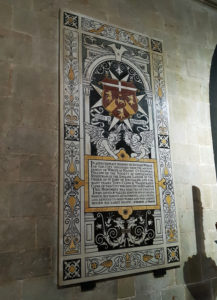Richard Woof (1821-1877)
Richard Woof was born in St John’s, Worcester, on 18 December 1821. As a young man Woof eschewed his father’s career as a pharmacist and began training as a solicitor. He was admitted to the roll in 1850, and by 1859 had entered into partnership with John Hill, a fellow solicitor and Worcester town clerk and clerk to the City Magistrates. Following Hill’s death in the winter of 1864, Woof assumed his business partner’s former civic posts, which he held until ill health forced his resignation in November 1871.

Monument to Richard Woof in Worcester Cathedral
During his service as town clerk Woof was tasked with ‘carefully arranging and collecting and catalogueing all the city records, documents, tokens, and pictures’ (Worcestershire Chronicle, 2 February 1878, 6). He pursued this project with all the interest of a passionate gentleman scholar; Woof held fellowships of the Society of Antiquaries, Royal Historical Society, Royal Society of Literature, and other learned societies, and was a founding member of the Worcester Diocesan Architectural and Archaeological Society (now the Worcestershire Archaeological Society), on whose committee he served as late as 1865. Woof’s published output reflects his diverse interests in local history during this period, and includes articles on the city’s seal and arms, royal expenditure in Worcester during the Civil War, and, most importantly, pioneering studies of Worcestershire’s seventeenth century token coinage. Though modestly professing ‘no pretention to numismatic skill’, Woof laid essential groundwork for a modern understanding of the token series; during the mid- to late 1860s he actively developed the Corporation of Worcester’s numismatic collection, which included a large number of tokens sourced from the local collections of Alexander C. Sheriff, Alexander S. Featherstonhaugh, George Birley, and others, and his published work on tokens constitutes the first systematic effort to assess the county series in light of historical information gleaned from the records of the Corporation of Worcester. His passion for numismatics during this period was lampooned in a poetic survey of civic noteworthies published in the Berrow’s Worcester Journal:
‘Lieutenant Woof (and Paymaster)
He hurries o’er the ground
As though some numismatical
Attraction he had found.
The Society of Literature
Have made him a Fellow now;
Scriblerus he removes his hat,
And maketh him a bow.’Berrow’s Worcester Journal, 11 July 1868, 10
Within a month of Woof tendering his resignation as town clerk the mayor of Worcester launched a campaign to provide a testimonial expressing gratitude for his contributions to city life. By mid-January 1872 the subscription had raised £305, which provided Woof with a substantial gift presented to him at a well-attended ceremony held at the Worcester Guildhall on 5 June 1872: these included several pieces of antique and modern silver, comprising a fifteenth century parcel-gilt cup, a pair of sixteenth century silver-gilt flagons, a German parcel-gilt guild cup dating to 1689, a Renaissance silver chasse, a case of apostle spoons, a parcel-gilt rosewater dish, and a gilt carriage clock whose dial was inscribed ‘Presented as a public tribute to Richard Woof, Esq., F.S.A., with several examples of ancient silver work, upon retirement from the office of Town Clerk of Worcester, by his friends in the city and county. 1872.’ (Worcestershire Chronicle, 12 June 1872, 4). Despite retiring from civic service, Woof remained active as a solicitor for several years, operating from an office in the Exchange Chambers on Angel Street by 1873 and partnering with Henry Caldicott in 1875. During his later years he acquired a particular interest in genealogy, and eventually adopted the surname Woolfe in honour of his ancestor Francis Woolfe, who famously hid the future King Charles II in a barn at the family seat of Madeley following the Royalist defeat at Worcester in 1651. Woof died on 16 December 1877, and his service to the city is presently marked by a memorial plaque on the south aisle of the nave of Worcester Cathedral and a portrait displayed in the Worcester Guildhall.
Bibliography of Richard Woof (1821-1877)
Woof, R. 1864. On the seals and arms of the City of Worcester. Associated Architectural Societies’ Reports & Papers. 7. pp. 307-16.
Woof, R. 1871. Traders’ tokens and the tokens of Worcester and Worcestershire. Associated Architectural Societies’ Reports & Papers. 11. pp. 157-77.
Woof, R. 1872. The personal expenses of Charles II in the City of Worcester. Transactions of the Royal Historical Society. 1. pp. 34-53
Woof, R. 1874. Catalogue of manuscript records and printed books in the library of the Corporation of Worcester, and list of trade and other tokens & money pieces in the Corporation collection. Worcester: Knight and Porter.
